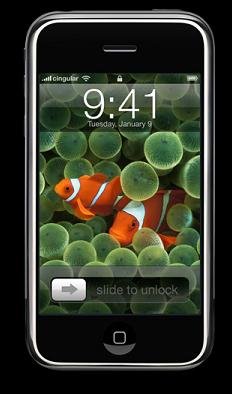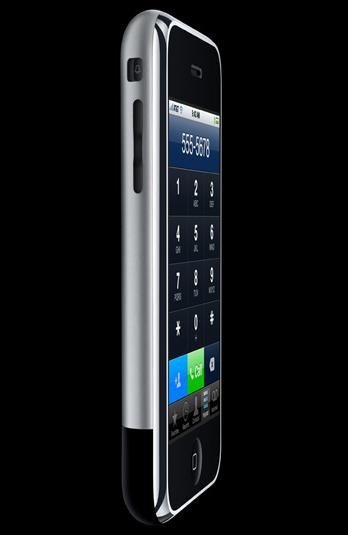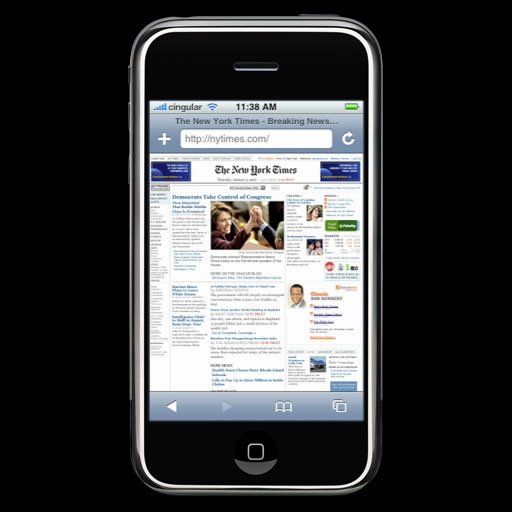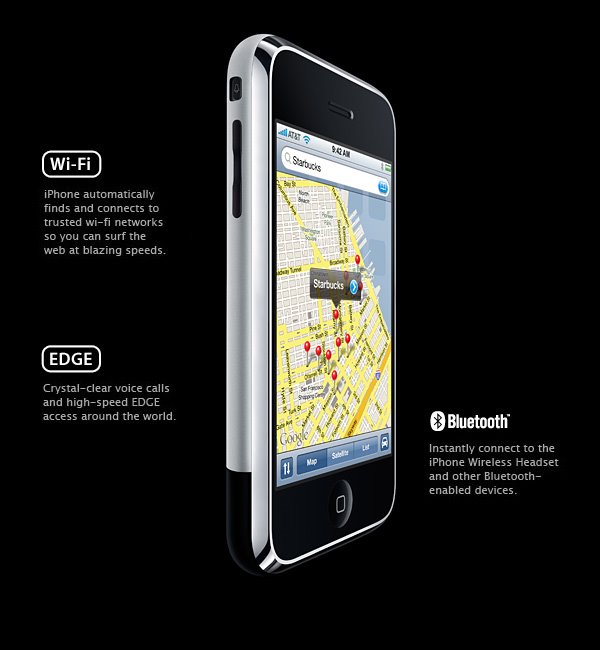"Yes, I'd like to order 4000 lattes to go please. Sorry, wrong number thank you!" Huge laughs, huge applause.
10:29am - "Pinch if I want to, or I can double-tap to zoom in. Let's go somewhere else..." People are rapt, everyone is actually literally leaning forward and on the edge of their seat. We've never seen a presentation like this before.
"Isn't that incredible? Right on my PHONE! Look at this, the Eiffel tower -- isn't that incredible? Here's the last one, the colliseum in Rome."
10:30am - "All these amazing things -- this is a breakthrough internet communicator built right into iPhone." Reviewing the features... "Incredible new technology for entering text, a real browser on the phone, we can zoom in, Google maps, Widgets... it's the internet in your pocket for the first time ever. You can't really think about the internet without thinking about google."
10:31am - "From google what we have on the phone is google search built right into the browser and google maps. We've been working closely with them.. it's my pleaseure now to introduce Dr. Eric Schmidt, Google's CEO."
10:32am - Eric: "I've had the privilege of joining the board and there's a lot of relationships... if we merge the companies we can call it Applegoo -- but I'm not a marketing guy. You can actually merge without merging. Each company should do the absolutely best thing they can do every time, and he's shown it today." Huge applause, again.
10:33am - "We can take the enormous brain trust of the Apple team and the open protocols of companies like google and put them in an environment for end users. From a gooogle perspective we've pushed very hard to partner with Apple and working with many many different data service, -- Steve showed a little bit. It comes together seamlessly. This is the first of a whole new generation..."
"Steve, my congratulations to you, this product is going to be HOT."
10:34am - "As a board member you'll get one of the first ones!" Har. "You also can't think about the internet without thinking about Yahoo. We've got Yahoo search built right in, and we've got Yahoo IMAP email services. So it's my great pleasure to introduce Jerry Yang, co-founder and Chief Yahoo!"
10:35am - Jerry's up on stage, "Thank you Steve. I'm not a board member of Apple, but I'd love to have one of these too. We're really proud of Yahoo to be partnering with Apple. One of the things we're going to be doing is launching some of our new services , Yahoo Go and One Search on this phone. Mail is a killer app on the phone, Yahoo is trying to redesign the web and email experience on mobile devices. The best spam protection, address books, and calendar when you're on yahoo -- It's like BlackBerry without an Exchange Server."
10:36am - "We want to take what Apple's doing reinventing the phone and do that on the internet -- great form factors, user experiences, and UI, and translate them into a seamless internet experience. We want to take the Web 2.0 into the device world -- you have my address Steve, please send it to me."
10:37am - "It's been great having the two greatest companies on the web right down the block. Thank you guys so much, you've really helped us put the internet in the phone.
10:38am - "So, an internet communicator, an iPod, and a phone. Let's put them all together and see what you can do in a real-life scenario..."
10:39am - Another hands-on demo. "Let's see what happens when a phone call comes while listening to music -- music fades out and the call comes through."
10:40am - Phil wants photos to use as his screen saver, one of the phones from Hawaii. Go figure! Steve is emailing the photo -- shrinks, compose window pops up (he's still on the phone with Phil, mind you), and he sends it.
He ends the call, and the music pops right back up, no pauses, no fuss. Uproarious applause.
10:41am - "Today Apple is reinventing the phone. How does this stack up? Let's look at the competition..." Treo, BB, E62, Q... comparing mail, contacts, calendars, web... "Let's see the web, we tried to make it look as good as we could. And this is what you get." Comparing music...
"After today, I don't think anyone's going to look at these phones the same way agaoin."
10:42am - Accessories: stereo headphones with a tiny dongle, mic and a switch. Push it together to answer or hang up on a call.
Bluetooth accessory: headset, black and thin "incredibly small" one button on the top, automatically pairs, "It's really simple."
"It's the coolest one we've ever seen."
Battery life: "A lot of these phones have low battery life. We've managed to get 5 hours of battery of talk time, video, and browsing. 16 hours of audio playback."
10:44am - We've been pushing the state of the art in every facet of this design. We've got the multi-touch screen, miniaturization, OS X in a mobile device, precision enclosures, three advanced sensors, desktop class applications, and the widescreen video iPod. We filed for over 200 patents for all the inventions in iPhone and we intend to protect them."
"We've advanced the state of the art in every aspect of design. It's the ultimate digital device. So what should we price it at?"
10:46am - "Our most popular iPod is $199 -- what's a smartphone cost? Somewhere around $299 with a two year contract."
He's combined the two for a $499 for the combo-- "What should we charge for the iPhone? We should charge more for this stuff!... "
10:47am -
So how much more than $499 should we price it? We thought long and hard about it... it does so much stuff..." He's stalling for the drama. Enough Steve!
"What should we price it at? For a 4GB model we're pricing it at $499 -- no premium whatsoever.
"We're going to have an 8GB model for just $599."
10:48am - "When's it going to be available? We're shipping them in June -- we're announcing it today because we have to go get FCC approval... we thought it'd be better to introduce this today rather than let the FCC introduce this.
Europe in the 4th quarter of this year, Asia in 2008. "We've chosen Cingular."
"They're going to be our exclusive partner in the US -- it's a unique partnership though. We're going to be doing innovation together. We worked on visual voicemail, the first fruit of this collaboration. We'll be selling iPhone through our own stores and Cingular stores."
10:49am - "It's my pleasure to introduce the CEO of Cingular, Stan Sigman." Why hello Stanny boy.
"We entered into contractual agreement without ever even seeing the phone -- that's because of the confidence I have of Steve to deliver on his vision...
10:50am - "It's a real honor for Cingular to be partnering with Apple -- it's AT&T. Days ago Cingular became a part of the new AT&T..." AT&T logo up on screen.
10:51am - "We're announcing a partnership that takes the mobile phone experience to a new level by bringing together the best network with the best device. Networks are the foundation of what Cingular and AT&T do."
"When it comes to networks AT&T wrote the book -- their quality is legendary. Put this with Apple products together and what do you get? You get the best voice and data experience..." Man this guy is a total snoozer.
10:52am - We've immediately dropped back into cuecard keynote mode, stats on Cingular, stores, distribution, yadda. "We're pleased to partner with Apple to deliver one of the most eagerly anticipated products ever -- the iPhone."
10:53am - "We are changing the way companies work together. Apple and Cingular have a multi-year exclusive partnership. This is not an MVNO -- ours is a unique relationship that lets Apple be Apple, and let's Cingular be Cingular."
10:54am - "iPhone owners will be Cingular and AT&T customers -- they'll get the best network and service in the business. Apple... Cingular... and AT&T have come a long ways."
"I hope you're as excited as we are... this is going to be a terrific ride." Huzzah, he's off stage!
10:56am - And Steve's back... "As Stan's said, we started working together about two years ago, and we come from two different worlds. We love these guys, we're going to bring some great stuff to market over the years together. Let's take a look at this market and how big it is. So how big is this market..."
Clickers are dead, even his replacement. "They're scrambling back stage right now." Laughter.
10:56am - "You know, when I was in high school, Steve Woz and I made this little device called the TV jammer -- this little oscillator that put out frequencies that would screw up the TV... We'd go into a dorm at Berkeley we'd screw up the TV while people are watching Star Trek."
Ok, we're back...
10:57am -
26m game consoles sold, 94m digital cameras, 135m MP3 players, 209m PCs, 957m phones...
1% market share is 10 million phones. "Exactly what we're trying to do, 1% market share in 2008, 10 million units and we'll go from there."
10:58am - "So, today we've added to the Mac and the iPod, we've added Apple TV, and now iPhone. And you know, the Mac is the only one you really think of as a computer, and we've thought about this and we thought, you know, maybe our name should reflect this better than it does."
"From this day forward we're going to be known as Apple, Inc.
We've dropped the computer from our name."
10:59am - "You know, I didn't sleep a wink last night, I was so excited about today. We've been so lucky at Apple, we've had some real revolutionary products. The Mac in 84, the iPod in 2001, and we're gonna do it again with the iPhone in 2007 -- we're VERY excited about this."
"There's an old Wayne Gretsky quote I love -- 'I skate to where the puck is going to be, not to where it's been.' That's what we try to do at Apple. Thank you very, very much." Huge, huge applause, standing ovation.
11:00am - "Thank you, thank you. I'd like to highlight the folks that worked on this product... can all the folks here who worked on this product please stand up? Let's give them a round of Applause."
11:01am - "I also can't leave without thanking our families -- they haven't seen a lot of us in the last 6 months. Without their support we couldn't do what we do. You don't know how much we need you and appreciate you, so thank you."
"We've got a really special treat today, we don't have a lot of traditions at Apple besides making great products. One of them is that John Mayer has helped us at every Macworld over the years."
11:02am - "It's our pleasure to welcome John Mayer," who will now play the keynote off. Anyone else remember that Chappelle show sketch?
That's it!








